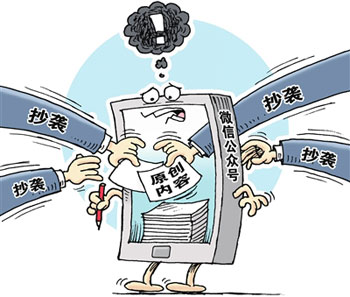Plagiarism and protection of originality in the digital age
The original title: "2016 Global Digital content Market Conference" was held in Geneva a few days ago.
How to protect the rights and interests of originators in the digital age

The popularity of the Internet not only facilitates the sharing of information resources, but also brings greater problems for the protection of intellectual property rights. Many of the original works published online have more value gains by large technology companies, thus damaging the creative motivation of the original authors. How to protect the rights and interests of original authors was discussed at the 2016 Global Digital content Market Conference held in Geneva, Switzerland a few days ago.
Original works--
Giving is not commensurate with return.
According to the data of the World intellectual property Organization, the creative industry in the digital age is developing rapidly. It has created 30 million jobs worldwide and achieved US $2.25 trillion in revenue, making it the seventh largest industry in the world.
Recently, the 2016 Global Digital content Market Conference was held in Geneva, Switzerland. Hundreds of government, institutional and business representatives from all over the world, as well as music, film, television, broadcasting, publishing and other practitioners, are talking about their survival experiences, growth gains, confusion and anxiety in the digital age on the banks of Lake Geneva. "how to protect the rights and interests of originators in the digital age" is one of the topics generally concerned by the participants.
Francis Gurry, director-general of the World intellectual property Organization, pointed out that in nearly a decade of rapid changes in the digital world, the business model of creative industries has been completely rewritten. In the field of the music industry, for example, according to the 2014 Digital Music report of the International Federation of the Phonographic Industry, the global record industry's output value in 2014 was US $15 billion, down 3.9% from 2013, while digital music revenue increased to US $6.8 billion.
The global film industry faces a similar situation. According to the 2014 Cinema Market Statistics report of the Motion Picture Association of America, box office revenue has grown slowly over the past decade, with global box office receipts of $36.4 billion in 2014, an increase of only 1%. Sales of DVDs and other CDs have declined, while digital film sales have increased. Electronic sales of newly released films in the US increased by 60 per cent in 2014, while digital film purchases in the UK in 2013 totaled $490 million, a fivefold increase from 2002.
As a result of such a trend, the expansion of the global digital world has led to the transfer of the industrial value chain and the redistribution of interests of different subjects in the value chain.
At this conference, a common view of many music producers, film stars, writers and journalists is that digital transformation brings great opportunities to the creative industry on the one hand, and fundamental challenges and even threats on the other. As the original creators and providers of digital content, their income and contribution are not symmetrical, or even have no return.
American scientist and thinker Jay Ranil first put forward the concept of "virtual reality" in the 1980s, and his speech was thought-provoking: "in fact, only a small number of scientific and technological elites have made excess profits." and most people are becoming their slaves. " He believes that, encouraged by the Internet spirit of open and shared resources and information, writers, musicians and journalists continue to publish their intellectual achievements and imagination on the Internet in the form of fragments, but they are usually not paid. Large technology companies are the integrators and beneficiaries of these fragments. "for example, they will cut a movie into chapters, with interesting narrations or voiceover, attract millions of viewers, and then insert ads to earn revenue, but the money will not be distributed to the original creators, and the fruits of people's labor will be embezzled."
In Ranil's view, "the World intellectual property Organization should strive to develop more reasonable, fair and meticulous digital rules to provide everyone, not only creative professionals, but also ordinary people, with equal access to the field of content creation." and open up ways to get remuneration so that intellectual property rights can benefit everyone. "
Whether or not to pay?
It is still difficult to reach a consensus.
At the meeting, representatives of both developed and developing countries expressed their desire to "respect intellectual property rights and protect the rights and interests of originators." Conceptually, people are forming a consensus, but due to different economic conditions, development or cultural customs, the actions of different regions and countries are still very different.
Tian Zhiren, a Chinese-American composer who has won two Grammy Awards, says that in Europe and the United States, more and more people are willing to pay for good music. "Spotify, which was born in Sweden in 2008, is currently the largest legitimate streaming music service platform in the world, with 75 million users worldwide, including 20 million paying users."
Ms. Wuluma from Kenya asked, "if the average person in a country lives on less than $1 a day, how much can people afford to pay for listening to music and watching movies?"
Nigerian film star Orika, let many delegates know for the first time that there is a "Nollywood" in Africa, which produces nearly 2000 films a year.
"in Nigeria, a movie ticket costs nearly $7, while a pirated CD costs only $1, so most films cannot be shown in theaters, and directors and actors earn very little." Orica hopes that African films can leapfrog in the digital age. "of course, we need a lot of conditions, more popular, fast and cheap Internet, people have more disposable income, and so on, and we still have a long way to go."
"in some places, people still have a lot of wrong and confused ideas that need to be changed." Ms. Tidcharak, a Thai publisher, said, "many people in Thailand think that pirated books are cheap and can be bought by the poor. What's wrong with that?" If all e-books can be downloaded and read for free, wouldn't it be a greater act of charity to enable more people to acquire information and knowledge? " Tidcharak pointed out, "therefore, we must persist in guiding and educating readers to make people realize that infringement is extremely harmful in the long run, which will not only restrain the author's desire for creation, but also eventually weaken the vitality and competitiveness of national culture."
Intellectual property rights-
Be recognized by more Chinese people
Ms. Silvia, president of the Chilean Actors' Union, stressed many times in her speech that "the Beijing Treaty on Audio-Visual performance is an important basis for performers to seek protection, and we need to vigorously promote it and promote it." Sylvia said that the treaty gives creators of music, film, drama and other works the right to license or prohibit others from using their works in accordance with the law, and the term of protection is up to 50 years.
In June 2012, at the World intellectual property Organization diplomatic Conference on the Protection of Audio and Video performances held in Beijing, the participants formally signed the Beijing Treaty on Audiovisual performances. Gao Rui once spoke highly of the Beijing Treaty on Audio-visual performance: "the Beijing Treaty on Audiovisual performance fills the gap in the international treaty on comprehensive copyright protection in the field of audio-visual performance. it is of milestone significance in promoting the healthy and prosperous development of cultural industries all over the world."
In 2013, iqiyi first launched the "online movie strategy" and the "account-sharing model" with profits tilted to the creators in China. At this conference, Yang Xianghua, Senior Vice President of iqiyi, as a special guest of the organizer, shared his experience and experience with the delegates.
"in 2015, iqiyi launched 612 online films, half of which were profitable, and the share of 35 films exceeded 1 million yuan, expanding the survival and development space for many dreamy and talented young filmmakers and a group of small and medium-sized production companies." Yang Xianghua said, "because of the new financing channels, online films now invest more, have a wider range of themes and produce more details than they did two years ago. What is gratifying is that the good situation and broad prospects of online movies are also attracting many famous directors and actors to join them, so as to continuously improve the quality of online films. a win-win situation between creators and consumers and a sustainable development model of virtuous circle are taking shape. "
- Prev

Reform the research and development of new products on the pesticide supply side
Reform the research and development of new products on the pesticide supply side
- Next

"Village doctor online" APP the misdiagnosis rate of seeing a doctor in the village is low.
"Village doctor online" APP the misdiagnosis rate of seeing a doctor in the village is low.
Related
- A course of planting techniques and methods on how to grow carrots
- How to plant the latest tulips?
- Is it better to pick tea in the morning or in the afternoon? When is the best time for tea to be picked? what is the third or fifth tea?
- Launch Yuanxiao Happy combination Haocha + Tea Yuan healthy Taste
- Penghu Tourism "Fireworks 20 Parade with You"
- 2022 West Lake Happiness holds "Digital Revitalization Voucher" and draws iphone13 and laptop.
- Banqiao Fuzhou social houses are designed to change start-up combined with police elimination to create a safe and livable environment
- The convenient measure of "mechanical weeding" in Xinbei has been abused and the Agriculture Bureau has imposed heavy penalties on the illegal land consolidation.
- Changgeng University Joins Hands with Four Memory Factories to Rescue Memory Talent Shortage
- The list of Taiwan's top 100 MVP managers is listed by the Director-General of the Farmers' Association of Sanxia District.

